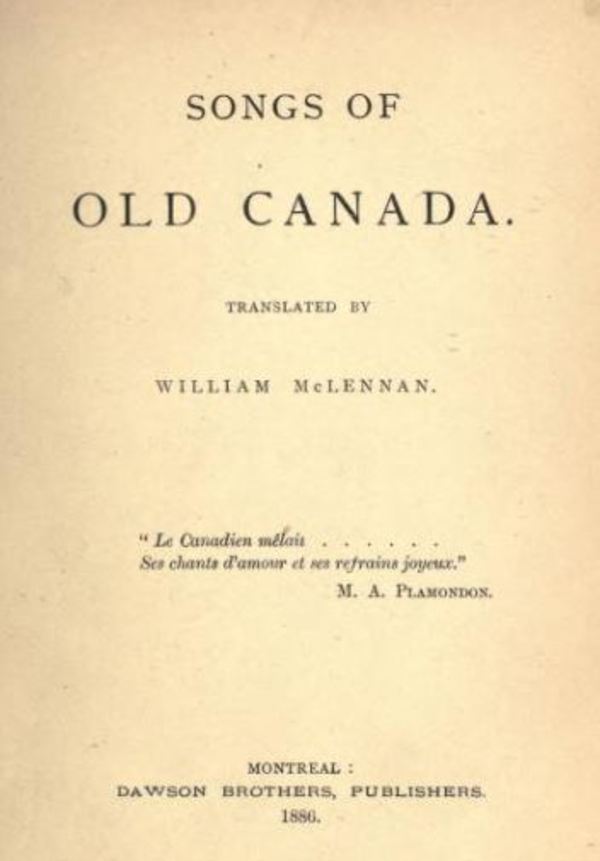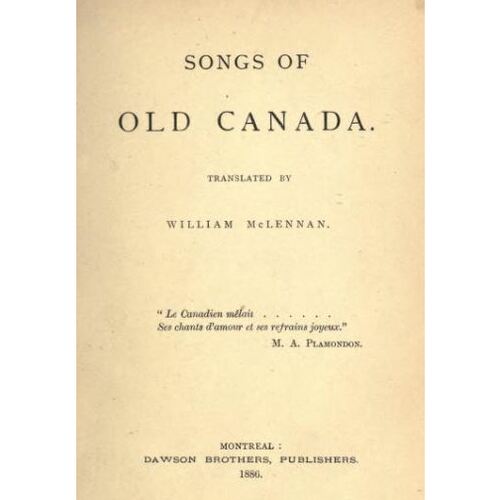
Source: Link
McLENNAN, WILLIAM, notary, translator, and author; b. 8 May 1856 in Montreal, fourth child of Hugh McLennan* and Isabella Stewart; m. 7 June 1883 Marion Paterson of Quebec, and they had two daughters and one son; d. 28 July 1904 in Fiesole, Italy.
The son of a wealthy Montreal grain merchant, William McLennan chose law as his own profession. After attending the High School of Montreal and graduating with a bcl from McGill College in 1880, he was commissioned a notary on 7 Oct. 1881. He established a partnership with Albert Clarence Lyman in 1882 but the following year was invited by William de Montmollin Marler and Ernest Henry Stuart to join a firm to be known as Stuart, Marler, and McLennan. He was subsequently associated with four other notarial partnerships, involving Marler, Henry Fry, John Fair, and John Alexander Cameron, until 1900, when ill health, apparently related to the asthma afflicting him from childhood, forced him into early retirement. With his family he moved to Europe, spending the winters in southern France and Italy and travelling widely in Spain, France, and Germany until his death. He was buried in the English cemetery in Florence.
A success in his profession, McLennan had also been active in the social and cultural life of Montreal in the 1880s and 1890s. He served on the governing council of the Fraser Institute [see Sir John Joseph Caldwell Abbott*], as a trustee of the Tiffin Library, and as an active member of the Art Association of Montreal, the Shakespeare Club, and the Pen and Pencil Club. Describing his notarial career as “the quietest in the world,” he modestly identified his “attempts at literature” only as his “greatest distraction,” but he maintained an interest in translation and the writing of poetry, fiction, and essays throughout his life.
McLennan’s first major published work was Songs of old Canada (Montreal, 1886), a collection of 14 French Canadian folk-songs with his English translations on facing pages. Its preface reveals his concern that unless they were published, many of these songs might soon be lost. McLennan’s commentary in the work as well as the care with which he documented his sources reflect his penchant for scholarly antiquarianism. Only the second book-length attempt to present French Canadian folk-songs to an English-speaking audience, following George Thomas Lanigan’s National ballads of Canada (Montreal, 1865), Songs of old Canada invites comparison with any of its 20th-century successors in the poetic skill displayed and in the judicious selection of those songs “which appeared to the translator to offer the best opportunity for successful treatment in another language.” Quite appropriately, a contemporary review in the Montreal Daily Star praised McLennan for demonstrating in this book “the accuracy of a scholar and the fine feeling of a poet.”
Many of the translations in Songs of old Canada had first appeared in the Montreal Gazette in 1885, and over the next 20 years dozens of poems, stories, sketches, and abridged versions of both of McLennan’s novels were first published in Canadian and American newspapers and magazines. In Canada, these publications included the Dominion Illustrated Monthly and the Arcadia of Montreal as well as the Week, the Canadian Magazine, and the Globe of Toronto. In the United States, Harper’s New Monthly Magazine and Harper’s Weekly of New York presented his work to a larger audience. Beginning in 1891, the publication in Harper’s New Monthly Magazine of a series of seven stories ostensibly narrated by “mon compère Melchior” established his reputation as a master of French Canadian dialect in English; “nothing could be more delicate than the perfection with which its peculiarities are touched and turned to the light” in these stories, noted American author William Dean Howells. Not surprisingly, when McLennan collected 19 of his stories in 1899 under the title In old France and new, he dedicated the volume to Howells, thanking him for his encouragement.
McLennan was elected to membership in the Royal Society of Canada in 1899, sharing this honour with William Henry Drummond and Duncan Campbell Scott*. With Drummond he contributed to the vogue for literature written in dialect, and along with Scott he framed his stories and sketches of French Canadian life in sequences appealing to a contemporary taste for fiction of “local colour.” Thus, In old France and new begins with six stories set in post-revolutionary France and concludes with the seven narrated by “Melchior.” The middle section, “Canadian stories old and new,” comprises six tales, including what is perhaps his best known, “The indiscretion of Grosse Boule.”
McLennan’s interest in history is reflected in both his essays and his novels. For the opening of the new building of the Montreal Board of Trade in 1893, he produced a meticulously researched 50-page essay entitled “Montreal and some of the makers thereof.” Articles on the explorer Daniel Greysolon* Dulhut, the Montreal notary Bénigne Basset* Des Lauriers, and the history of engraving display the curiosity of a scholar and the precision of a notary. The novels Spanish John (1898) and The span o’ life (1899) attempt to yoke history to the conventions of fictional romance. Spanish John reworked the memoirs of Colonel John McDonell of Scothouse which had first appeared in the Canadian Magazine and Literary Repository (Montreal) in 1825. In the memoirs, McDonell, father of Miles* and John*, related his disillusioned service in the Jacobite cause after the battle of Culloden. Reviewers praised McLennan’s command of history but noted the absence of a love-plot, a problem remedied in The span o’ life, on which McLennan collaborated with Jean Newton McIlwraith*. If the expulsion of the Stuarts provided a common staple for late-19th-century historical romance, the influence of historian Francis Parkman* ensured that the fall of New France provided another, and The span o’ life ranges from Scotland to London, France, Louisbourg, and Quebec in building an intricate narrative based on the published memoirs of army officer James Johnstone*.
After the serial publication of an abridged version of Spanish John in Harper’s New Monthly Magazine, a brief literary battle developed when Thomas Guthrie Marquis* charged McLennan with plagiarizing. McLennan’s reply offered a meticulous explanation of the circumstances involved. That contemporaries such as Edward William Thomson* and Drummond rushed to his defence reflected both their confidence in his academic integrity and their affection for what McLennan’s brother, John Stewart*, described as “his urbane charm, his hospitality and his constant eagerness to take his full share of effort for the building up of those activities which offset Samuel Butler’s gibe – ‘Oh God, Oh, Montreal!’” Surveying Canadian literature in 1913, Marquis could unstintingly praise McLennan “as the author of three notable books of fiction, of an excellent volume of translations, . . . and of original stories and essays of a high order.”
William McLennan is the author of An outline of the history of engraving ([Montreal, 1881]); “Anciens montréalais, I: Bénigne Basset, notaire royal, 1639–1699,” Le Canada français (Québec), 1re sér., 3 (1890): 469–77; “A gentleman of the Royal Guard, Daniel de Gresollon, Sieur Du L’Hut,” Harper’s New Monthly Magazine (New York), 87 (1893): 609–26; “Montreal and some of the makers thereof,” Montreal, Board of Trade, A souvenir of the opening of the new building, one thousand eight hundred and ninety three (Montreal, 1893), 7–57; Spanish John, being a memoir, now first published in complete form, of the early life and adventures of Colonel John McDonell, known as ‘Spanish John,’ when a lieutenant in the company of St James of the Regiment Irlandia, in the service of the king of Spain operating in Italy (New York, 1898); In old France and new (Toronto, 1900); “Canada,” The literature of American history: a bibliographical guide . . . , ed. J. N. Larned (Boston, 1902), 395–440; “The death of Dulhut,” RSC Trans., 2nd ser., 9 (1903), sect.ii: 39–47; and, in collaboration with J. N. McIlwraith, The span o’ life, a tale of Louisbourg and Quebec (New York, 1899). He also translated Songs of old Canada (Montreal, 1886).
McGill Univ. Libraries (Montreal), Dept. of Rare Books and Special Coll., ms coll., ms 238, ms 240. Gazette (Montreal), 30 June 1904. Bookman (New York), 7 (1898): 138–39. A. D. Brodie, “Canadian short-story writers,” Canadian Magazine, 4 (November 1894–April 1895): 334–44. “Canadian celebrities, no.v – Mr. William McLennan,” Canadian Magazine, 13 (May–October 1899): 251–53. Canadian men and women of the time (Morgan; 1898). W. D. Howells, W. D. Howells as critic, ed. E. H. Cady (London and Boston, 1973). Lit. hist. of Canada (Klinck et al.; 1976–90). J. S. McLennan, Hugh McLennan, 1825–1889 (Montreal, 1936). T. G. Marquis, “English-Canadian literature,” Canada and its prov. (Shortt and Doughty), 12: 493–589; “Spanish John vs. Mr. William McLennan,” Bookman, 7: 40–13. J.-E. Roy, “M. William McLennan,” La Rev. du notariat (Lévis, Qué.), 7 (1904–5): 25–32. Standard dict. of Canadian biog. (Roberts and Tunnell).
Cite This Article
Leslie G. Monkman, “McLENNAN, WILLIAM,” in Dictionary of Canadian Biography, vol. 13, University of Toronto/Université Laval, 2003–, accessed March 1, 2026, https://www.biographi.ca/en/bio/mclennan_william_13E.html.
The citation above shows the format for footnotes and endnotes according to the Chicago manual of style (16th edition). Information to be used in other citation formats:
| Permalink: | https://www.biographi.ca/en/bio/mclennan_william_13E.html |
| Author of Article: | Leslie G. Monkman |
| Title of Article: | McLENNAN, WILLIAM |
| Publication Name: | Dictionary of Canadian Biography, vol. 13 |
| Publisher: | University of Toronto/Université Laval |
| Year of publication: | 1994 |
| Year of revision: | 1994 |
| Access Date: | March 1, 2026 |



